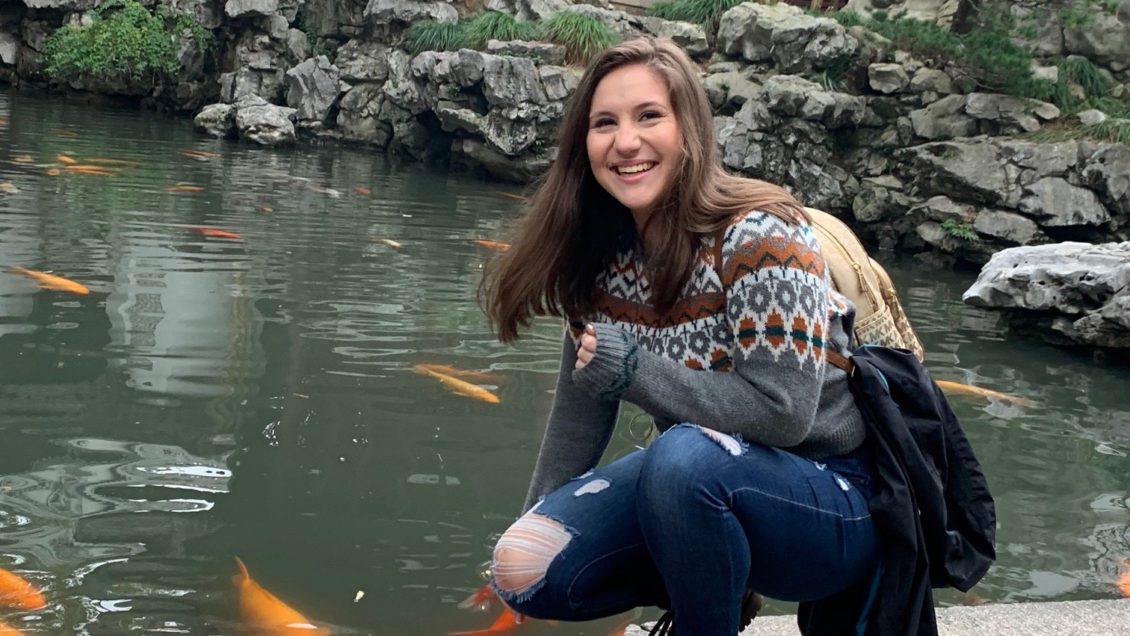
In mid-February, Claire Campbell spent two weeks sequestered in her parents’ Lexington, South Carolina home after leaving China during the early phases of the novel coronavirus (COVID-19) outbreak.
The first thing she did after completing her quarantine on Feb. 13 – and receiving a clean bill of health — was to visit friends in Clemson.
“I was very happy to get out of quarantine,” Campbell said.
The Language and International Business major had planned to spend the entire semester in Shanghai as a part of a study-abroad program. Campbell, who speaks four languages, was there to continue her advanced studies in Chinese culture and language at Shanghai University. The spring portion of the program was canceled, however, as the coronavirus epidemic continued to spread in late January.
“I was devastated when I first found out because I worked three years to get to this point,” said Campbell, 20.
Equally disappointing, Campbell faced the possibility of having to take a semester off and delay her plans to graduate in December 2020.
That’s when the department of languages sprang into action on her behalf. Su-I Chen, a senior lecturer in Chinese, found room for Campbell in four courses this spring.
Campbell couldn’t attend the classes in person during her quarantine time, nor did she have a Clemson dorm room to go to afterwards. So, Chen arranged for Campbell to attend her classes by Skype while she continued to live at home in Lexington.
“It’s going really well,” Campbell said of her classes. “I feel involved, as if I’m really there. I’m very grateful. Dr. Chen handled it all amazingly.”
And Campbell will get to graduate, as planned, in December 2020.
“I think the entire University is very supportive of Claire from the top to the bottom,” Chen said.
First time in China
The first few weeks of the spring semester were a whirlwind for Campbell.
Campbell arrived in Shanghai on Jan. 6 with a cohort of 25 other students, most from universities across the United States. They were there as a part of a program organized by the University Studies Abroad Consortium, an independent organization.
“It was my first time in China,” Campbell said. “I was excited just to step out of my room. Every experience seemed to be a learning opportunity.”
A few days later, however, the students began to hear of a virus in Wuhan, the capital of Hubei province, more than 500 miles away.
“When we first heard about it, it seemed so far away, and we thought it was just another strain of the flu,” Campbell said. “But then the infection rate skyrocketed and the mortality rate went up, and that’s when we understood how serious it was.”
As the coronavirus spread to Shanghai, Campbell and her fellow students found themselves quarantined in their dorm rooms, keeping in touch through text messages and social media.
They were allowed to leave the dorm only once a day to go to the cafeteria, and were required to wear surgical masks. On the way back to their dorm rooms, they had to have their temperature checked.
The bustling city of Shanghai suddenly became more subdued, and temperature checks became routine everywhere, Campbell said. Police and military officials patrolled the streets; other officials sprayed disinfectant.
Everyone seemed to be wearing a mask, she said.
“If you went into a restaurant or bank, there was someone there with hand sanitizer and a thermometer,” Campbell said. “You couldn’t go anywhere without having your temperature checked.”
Then, on Jan. 28, Campbell got the bad news: the University Studies Abroad Consortium was canceling its spring program.
“We were told we’d need to find a flight home as soon as possible,” Campbell said.
Two days later, Campbell was on her way from Shanghai to Newark, then Charlotte, then Lexington, wearing a series of masks.
“On the flight from Shanghai, even the flight attendants were wearing masks,” Campbell said. “When I wore one from the flight from Newark to Charlotte, I got a couple of odd looks.”
Back home again
When Campbell returned to Lexington on Jan. 31, she found herself the focus of media attention. She was interviewed by WIS News 10 in Columbia, WYFF News 4 in Greenville, and the New York Times.
“I was dumbfounded,” Campbell said. “I certainly didn’t expect that.”
Her parents joined her for the two-week quarantine at home. When reached during that time, Campbell sounded cheerful, but added, “I’m going stir-crazy. At least I can paint, listen to music, watch TV, just anything to keep my mind busy.”
A family friend, meanwhile, was leaving meals at the front door.
Campbell has stayed in touch with her fellow students from the Shanghai program. No one contracted the coronavirus, she said.
She still has plans to visit China sometime in the future and perhaps work there as a translator and cultural mediator who helps international employees understand other cultures.
“I’m not sure when I’ll return, but I know I will return,” Campbell said.
All in all, Campbell considers herself lucky.
“I’m one of the lucky ones because I was able to evacuate,” Campbell said. “People in Wuhan — or the Hubei province — their city is closed, so they couldn’t get out if they wanted to. I was lucky enough to go home.”
Get in touch and we will connect you with the author or another expert.
Or email us at news@clemson.edu

